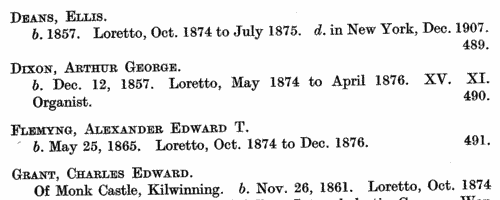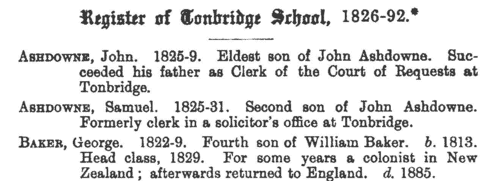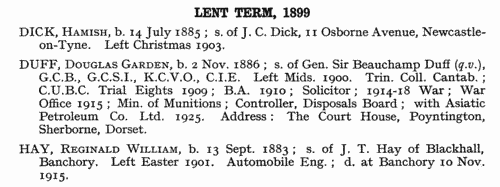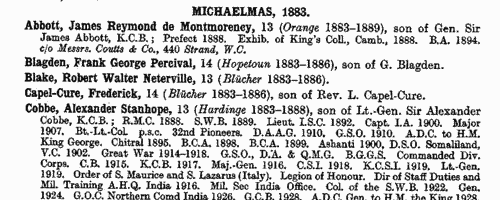Campbell Surname Ancestry ResultsOur indexes 1000-1999 include entries for the spelling 'campbell'. In the period you have requested, we have the following 2886 records (displaying 1441 to 1450): Single Surname Subscription | | | Buying all 2,886 results of this search individually would cost £16,616.00. But you can have free access to all 2,886 records for a year, to view, to save and print, for £100. Save £16,516.00. More... |
These sample scans are from the original record. You will get scans of the full pages or articles where the surname you searched for has been found. Your web browser may prevent the sample windows from opening; in this case please change your browser settings to allow pop-up windows from this site. Unclaimed Naval Prize Money from the China War
(1856-1860)
Various prize moneys were awarded to officers and men who served on board her Majesty's ships on the China Station during the war of 1856 to 1880. Firstly, there was a parliamentary grant of one month's pay to those serving on the Acorn*, Actaeon*, Adventure, Algerine*, Amethyst, Assistance*, Banterer*, Barracouta, Belleisle, Bustard, Calcutta*, Camilla, Clown*, Comus, Cormorant, Cruiser*, Drake*, Elk*, Encounter, Esk*, Firm*, Forester*, Furious*, Fury, Haughty*, Hesper*, Highflyer*, Hornet*, Inflexible*, Janus*, Kestrel*, Lee*, Leven*, Melville, Minden, Nankin*, Niger*, Nimrod*, Opossum*, Pique, Plover*, Princess Charlotte, Racehorse*, Raleigh, Sampson*, Sans Pareil*, Slaney*, Spartan, Starling*, Staunch*, Surprise*, Sybille*, Tribune, Volcano*, Watchful*, Winchester, and Woodcock*; in addition Canton booty was awarded to those serving on the ships asterisked (plus the Bittern and Coromandel tenders) at Canton on 28 and 29 December 1857, when that city was bombarded and captured. Then those on board the Bustard, Cruiser, Esk, Forester, Haughty, Highflyer, Lee, Niger, Nimrod, Sampson, Surprise, and the boats of the Elk, were rewarded for the captures of junks for breach of blockade of Canton River between 29 August and 19 December 1857. Other captures made by her Majesty's ships led to various other awards distributed between 1 January 1855 and 19 February 1863. Nevertheless, for one reason or another a substantial number of these prizes, from as little as 1s 7d to as much as £28, remained undistributed by 1902, when this comprehensive list of the unclaimed moneys was printed. In each case the sailor's name is given first (surname, then christian name or initials); rank or rating; ship in which serving at time of capture or award; parliamentary award; Canton booty; captures for breach of blockade of Canton River; other captures; and then the total.CAMPBELL. Cost: £6.00.  | Sample scan, click to enlarge

|  British infantry fighting in China
(1858-1860) British infantry fighting in China
(1858-1860)
The China Medal was awarded to soldiers and sailors who took part in the prosecution of the war against the Chinese from 1856 to 1860. Separate clasps were awarded for men who had been in receipt of the China Medal of 1842; for being actually present at Canton on 28 and 29 December 1857, when that city was bombarded and finally captured; for being actually engaged in the operations which ceased with the first capture of the Taku Forts, 20 May 1858, and led to the Treaty of Tientsin; for being actually present at the capture of the Taku Forts 21 August 1860; and for being actually present before Pekin the day the gate of that city was given up to the allied (British and French) army, viz. on 13 October 1860. The 2nd battalion, the 1st (The Royal) Regiment of Foot, based at Birr, left Ireland for Cephalonia 31 January 1853. After fighting in the Crimea, the battalion was moved to Malta, then to Gibraltar; was transferred from Gibraltar to China in 1858; and did not return to England until 1861. The battalion took part in the capture of the Taku Forts and that of Pekin.CAMPBELL. Cost: £8.00.  | Sample scan, click to enlarge

| Boys entering Loretto School
(1860)
The Reverend Dr Thomas Langhorne, who came to Musselburgh in Midlothian as an Episcopalian Church clergyman, established a small school for boarders and day scholars at Loretto House, so called because the grounds contained the ruins of the mediaeval chapel of St Mary of Loretto. To celebrate the centenary of the school in 1925, a second edition of the school register was published, edited by A. H. Buchanan-Dunlop. Relatively little was known of many of the earliest scholars, but from 1835 onwards the register generally gives full name, in capitals, surname first; date of birth; period of time at Loretto; a brief biography; date of death; whether brother of any other boy in the register; and a sequential number. CAMPBELL. Cost: £4.00.  | Sample scan, click to enlarge

| Boys entering Tonbridge School
(1860)
W. O. Hughes-Hughes, late Assistant-Master of Tonbridge School, prepared this edition of the school register. The Kent grammar school was founded by royal charter in 1553, but the surviving register commences with the names of 69 boys called over on Skinners' Day 1826. After that they are arranged alphabetically by quarter to 1833, and thereafter by term of entry. Each entry gives, where known: the boy's surname (in capitals) and full christian name(s); the years when at the school; father's name; year of birth; school honours; and a resume of his subsequent career. CAMPBELL. Cost: £4.00.  | Sample scan, click to enlarge

| Boys entering Trinity College, Glenalmond
(1860)
Trinity College, Glenalmond, Perthshire, was originally founded as a college at which young men might be trained for the ministry of the Scottish Episcopal Church, and the sons of the laity might be educated and brought up in the faith and tradition of the Church. In 1876 the Theological College was transferred to Edinburgh, Glenalmond remaining as a boys' school. This second edition of the school register, edited by G. St Quintin, was published in 1955, incorporating the text of the first edition prepared by E. W. Neish. The scholars are listed by term of entering the school, and then alphabetically by surname; the details then given are full christian names, date of birth; name of father; any distinctions within the school; and then a career synopsis, with date and place of death where known. CAMPBELL. Cost: £6.00.  | Sample scan, click to enlarge

| Boys entering Wellington College in Berkshire
(1860)
Wellington College, near Wokingham, was originally founded for the education of sons of military officers. A register of boys entering the school from First Term 1859 to Michaelmas 1933 was compiled by F. G. Lawrence for the Old Wellingtonian Society. In each entry the boy's name is given in full, in bold, surname first; age at entry (usually 11 to 14); then, in brackets, the name of the dormitory or house to which he belonged, in italics, with the years of his stay; then his father's name (usually surname and initials, but not christian name) with military decorations where appropriate. School prefects and captains are noted as such; if the boy played cricket for the school, XI with the years; academic honours, scholarships, &c.; a brief biography; and date of death, or (where known) address in 1933. Year of marriage is given, and sometimes the wife's name and/or her father's name. Clearly, those boys who kept contact with the school and/or had distinguished military careers have detailed entries; others disappeared into oblivion on leaving.CAMPBELL. Cost: £6.00.  | Sample scan, click to enlarge

|  British infantry fighting in China
(1860) British infantry fighting in China
(1860)
The China Medal was awarded to soldiers and sailors who took part in the prosecution of the war against the Chinese from 1856 to 1860. Separate clasps were awarded for men who had been in receipt of the China Medal of 1842; for being actually present at Canton on 28 and 29 December 1857, when that city was bombarded and finally captured; for being actually engaged in the operations which ceased with the first capture of the Taku Forts, 20 May 1858, and led to the Treaty of Tientsin; for being actually present at the capture of the Taku Forts 21 August 1860; and for being actually present before Pekin the day the gate of that city was given up to the allied (British and French) army, viz. on 13 October 1860. The 1st battalion, the 2nd (The Queen's Royal) Regiment of Foot, based at Walmer, embarked for the Cape of Good Hope 24 June 1851. The battalion took part in the capture of the Taku Forts and in that of Pekin.CAMPBELL. Cost: £8.00.  | Sample scan, click to enlarge

|  British infantry fighting in China
(1860) British infantry fighting in China
(1860)
The China Medal was awarded to soldiers and sailors who took part in the prosecution of the war against the Chinese from 1856 to 1860. Separate clasps were awarded for men who had been in receipt of the China Medal of 1842; for being actually present at Canton on 28 and 29 December 1857, when that city was bombarded and finally captured; for being actually engaged in the operations which ceased with the first capture of the Taku Forts, 20 May 1858, and led to the Treaty of Tientsin; for being actually present at the capture of the Taku Forts 21 August 1860; and for being actually present before Pekin the day the gate of that city was given up to the allied (British and French) army, viz. on 13 October 1860. The 99th (Lanarkshire) Regiment of Foot, based at Cork, embarked for India in September 1858, and was transferred to China in 1860; moved to South Africa in 1865, and returned to England in 1869. The regiment took part in the capture of Pekin.CAMPBELL. Cost: £8.00.  | Sample scan, click to enlarge

|  British infantry fighting in China
(1860) British infantry fighting in China
(1860)
The China Medal was awarded to soldiers and sailors who took part in the prosecution of the war against the Chinese from 1856 to 1860. Separate clasps were awarded for men who had been in receipt of the China Medal of 1842; for being actually present at Canton on 28 and 29 December 1857, when that city was bombarded and finally captured; for being actually engaged in the operations which ceased with the first capture of the Taku Forts, 20 May 1858, and led to the Treaty of Tientsin; for being actually present at the capture of the Taku Forts 21 August 1860; and for being actually present before Pekin the day the gate of that city was given up to the allied (British and French) army, viz. on 13 October 1860. The 44th (The East Essex) Regiment of Foot, based at Colchester, having returned from the Crimea, embarked for India 26 August 1857, and was transferred thence to China. The regiment took part in the capture of the Taku Forts.CAMPBELL. Cost: £8.00.  | Sample scan, click to enlarge

|  British infantry fighting in China
(1860) British infantry fighting in China
(1860)
The China Medal was awarded to soldiers and sailors who took part in the prosecution of the war against the Chinese from 1856 to 1860. Separate clasps were awarded for men who had been in receipt of the China Medal of 1842; for being actually present at Canton on 28 and 29 December 1857, when that city was bombarded and finally captured; for being actually engaged in the operations which ceased with the first capture of the Taku Forts, 20 May 1858, and led to the Treaty of Tientsin; for being actually present at the capture of the Taku Forts 21 August 1860; and for being actually present before Pekin the day the gate of that city was given up to the allied (British and French) army, viz. on 13 October 1860. The 1st battalion, the 3rd (East Kent) Regiment of Foot (the Buffs), based in Limerick, embarked for Malta 2 April 1851. The battalion took part on in the capture of the Taku Forts.CAMPBELL. Cost: £8.00.  | Sample scan, click to enlarge

|
Research your ancestry, family history, genealogy and one-name study by direct access to original records and archives indexed by surname.
|













